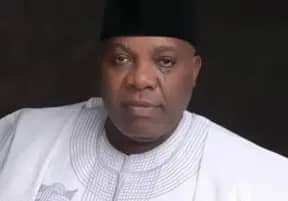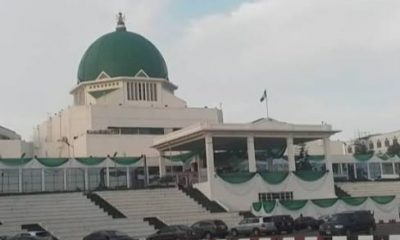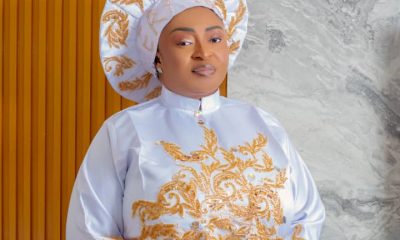society
Tinubu Has Plans To Change Nigeria — Doyin Okupe

Tinubu Has Plans To Change Nigeria — Doyin Okupe
…It Will Take Two Years For Reforms To Bear Fruits
…Says Atiku, Obi Had Nothing To Offer
…2023 Election Was Not Rigged
For Doyin Okupe, sitting on the fence is not an option. He prides himself as a rare politician who speaks without minding whose ox is gored. Mostly misunderstood, he has been around for a long time but has refused to exit the stage.
As a spokesman to two former presidents, he courted controversies and was once dubbed the attack dog to a sitting president. From seeing satire to innuendoes thrown at him, Okupe has waxed stronger brushing aside criticisms, he said he has grown accustomed to and fears no one. To him, eliciting criticisms is the price for being principled, and it amounts to anathema to stay under the radar for fear of being criticised.
In this interview with Isuma Mark of THE WHISTLER, Okupe took on long time political colossus, Atiku Abubakar and 2023 presidential candidate of the Labour Party, Peter Obi, dismissing them as having nothing better to offer Nigeria. He lambasted them for daring to propagate what he claimed was a fallacy that the 2023 election was rigged.
He dubbed President Bola Tinubu a reformer in Aso Rock whose policies would begin to yield results from two years of the administration.
Except…
You’ve been in the news lately with critics and supporters saying that you’re looking for a job. What’s happening?
I am 72 years old. I have been a spokesman for two former presidents in Nigeria. I’ve been the spokesman of a major political party, NRC (National Republican Convention). I was also the spokesman of the Liberal Convention.
I have had my bit. Do you understand? I have had my bit. Those who say I’m looking for a job; if you checked that demographic, they are people in their 20s who do not know to us
I have always gone for and spoken strongly about whatever I felt compelled to comment on. That has been my lifestyle. When I supported Obi (Peter), what was I looking for? Obi was not even in the country then. He never lobbied me. He never spoke to me. He never asked for my support.
I went to Abeokuta (Ogun State) and I had a press conference, and I said I am stepping down from running for president and that I will be supporting Peter Obi. What was I looking for then? Because I believed at that time in regional equity and justice for us. Because we believed that the presidency should come to the South.
After a Northerner had been there for eight years, there is an existing understanding in the polity of this country among the political elites that the presidency would rotate between the North — not only between the zones but between the North and the South. So, if the presidency is coming to the South, there are three zones in the South—South-West, South-South and South-East.
It was only the South-East that had not had a shot at it. Nobody lobbied me, no human being on earth came to me, and pleaded for my support.
I personally, having conferred with Chief Ayo Adebanjo, who advisedly decided that I should support the South East. The best candidate at that time in the South-East, in PDP, was Peter Obi.
So, that’s why I went to support him. So, what was I looking for? That is my style. That is how I am.
When I was in the NRC, I was one of the campaign directors for Bashir Tofar. We campaigned vigorously around the country, but we lost the election. The military tried to play a game, tried to recruit us, and they did, they finally recruited us (the NRC) to support the annulment.
I left and resigned from my membership of NRC and joined NADECO (National Democratic Coalition) at the time when my colleagues in the NRC — I was in the top bracket of NRC — were being made ministers, I left it and I joined NADECO.
Abiola (MKO) did not call me, nobody called me, but that was what was just, and that was what was fair. That has always been the underlying theme in our philosophy in all my political engagements.
When I supported Obasanjo in 1998, Obasanjo never, ever called me. I didn’t know him closely. We were not friends, we were not colleagues, we were not anything. But I believed that this was a general who had strength and capacity, and he would do well, better than any other candidates, including Falae, who I had been very close to because of NADECO.
I held a press conference, and I announced that I was going to support Obasanjo. Obasanjo did not know anything about it, and on the first of December 1998, I drove to Ota Farm to meet Obasanjo and declared support for him.
That’s how my journey with him started. So, those who see what I’m doing with Bola Tinubu today and thinking that it was some personal dream, I told you, they can only be young people who do not know. They don’t have the history; they don’t know what my pedigree is. I am a man that supports what I consider to be fair and just even if it is to my detriment.
I met the president, Tinubu, about a week ago. I’ve not seen him for seven or eight years. I have not spoken to him on the phone. He didn’t talk to me. But he’s somebody I know very well politically. We have never been on the same side before in politics but we’ve always shared a camaraderie since our NADECO days. We came very, very close. When you’re in the trenches and you’re fighting a liberation war or another, you tend to be bonded more than just ordinarily when there are no issues.
From that time, till when he was governor and left as governor, I’ve had opportunities to sit with Bola Tinubu for three hours unending. And he has impressed me, not only as a politician, but as a technocrat, a man that was capable of deep thinking.
He has developmental ideologies and policies at his fingertips. This thing, you don’t learn it. It’s a gift.
The last time we had anybody close to him was Awolowo (Obafemi). Awolowo was a very serious-minded politician, but who had ideas of public policies that would benefit the masses. That is what Bola Tinubu is today.
Bola Tinubu, you know, in the villa, we have a reformer, a president who is a reformer.
I’ve heard some people saying that Bola Tinubu came to the office without a plan, he has no clue, that is balderdash, that is total nonsense.
I have worked with two past presidents. I have studied other presidents closely from a very close point. I don’t know any Nigerian president from 1960 to date who has come more armed, better prepared for governance than this gentleman.
Unfortunately for him, he has come into government at a very terrible and awful time. And when I met him, I told him, ‘are you out of your mind?’How would you want to succeed a Buhari (Muhammadu) administration, eight years of total abandonment, decadence and retrogression?
He said that is his passion. He was driven by that passion to help Nigeria. Having been part and parcel of those who brought Buhari, you can’t blame somebody for bringing a leader. If the leader does not perform, it’s unfortunate. But if you are brave enough to say, yes, you know, whatever you have done wrong, let us put our necks out and correct it. And this is what this guy is doing.
How can you ask him, how can you ask a president, Bola Tinubu, how can you hold him accountable for the ills of 30, 40 years? And for the two-terms of national abandonment of the last eight years, it’s unfair, it’s unrealistic.
And go and check it, being a reformer, you know, he didn’t ask me to say this, but I’m telling you from my own common sense and understanding of how government works, Bola Tinubu will need a minimum of two years for some of his policies to be properly grounded, established and to begin to produce results.
I have gone to read history, I read about Lin Kuan Yew. Lin Kuan Yew had, you know, Singapore, and at that point in time, the other country next to it, Malaysia, before they pulled out. He had those 31 years to rule that country, to ground that country, to transform that nation from third world to first world. 31 years, I read his book.
He said, I did certain things that were not okay. He was even almost draconian at some points, but, you know, he was focused on what he wanted to do, Just like Bola Tinubu today appears to be very strong-minded, very focused, and determined to pull this through.
It’s going to be a couple of years of pain and hardship, but he’s doing what other presidents for the last 10, 20 years have refused to do. The choice he had was to run and was to come into governance and just continue business as usual. By the time he came to the government, 98% of our revenue generated was being used to pay debt
Arbitrage on the foreign exchange was at an alarming rate. We were subsidising power, subsidising hype, subsidising virtually everything. We have over-borrowed and we are now going back to the nefarious and condemnable, financially undisciplined act of printing currency. We printed more than 21 trillion. Nobody can continue like that. If we continue like that, we will become a totally devastating, failed state by now.
So, we should commend him, support him, pray for him, cooperate with him, and endure the hardship for this short period and wait for the results. The opposition is running helter-skelter, talking about all sorts of things.
The real opposition are Abubakar Atiku and maybe Peter Obi. In the first instance, the opposition appears to be unrealistic, saying the presidency was stolen. There’s nothing like that. No presidency was stolen. I’m not saying there was no rigging.
There was no election that we have done in Nigeria since 1960 to date that was not rigged, not one maybe Abiola’s election because of the unique nature of the voting pattern. You know it was Option A4 people were counted, apart from that every other election was rigged.
We were in this country when a sitting president (Umar Yar’adua) said the process that brought him into power was flawed. That was when he put up that Alias committee.
He confessed that it was flawed. I was involved in the process that brought Obasanjo. I was involved in the process that brought Yaradua
I was involved in the process that brought G.E.J. I knew about what brought in Buhari. All without exception were flawed. All.
So, talking about rigging, that’s not the issue. But you see, you only rig where you are strong. So, if you look at it properly, when three major candidates emerged for that election, it was obvious that we will have a minority administration.
Obi was substantially supported by the Southeast. And if the Labour Party or Obi, think that people rigged, APC rigged, how did Obi win the heartland of Bola Tinbubu? Why didn’t Bola Tinubu rig Lagos for himself? Why? If Obi said or the Labour Party said APC rigged the election, how come Obi was able to win the home base of Bola Tinubu? How come APC lost the election in the home base of a sitting president? How come APC lost the election in the home base of the Secretary to that government? The accusation about rigging does not hold water at all. It doesn’t hold water.
The truth of the matter is that under the best of conditions, the results we got may not have been the exact results but they will have that ratio. I was in a Labour party. We couldn’t have done better than we did. I knew that for other reasons, but that’s a discussion for another day.
And in any case, you know, when you look at it today, critically, Bola Tinubu has come into this government with better policy documentation than any of these two rivals by far.
Atiku is a magnificent, experienced, knowledgeable, and thoroughbred politician. I am telling you that I knew that for a fact. He also came with a testament, all right, that, you know, could hold sway, a testament which would have been, if he won, would have been binding on him to Nigeria.
But when we put the testament side by side, which is the correct reality we have on the ground today, it’s not applicable. The testament, the documents, and his preparation were hinged mainly on obtaining some funds, $10 billion and $15 billion or so.
They had that $15 billion and $5 billion, you know, loans, which they intend to inject into the economy and they sort a couple of things out.
That was theoretical. Because by the time Buhari was leaving, nobody was going to borrow Nigeria money Again. If people were ready to borrow Nigerian money, Buhari would not have had to go and print money. We were no longer credit worthy by the majority of the international financial institutions.
The premises and the pillars which Atiku placed this testament on are what you call sinking sand, they can’t work.
As for Peter Obi, Peter Obi has not given any documents to Nigerians as to what he was going to do. I can tell you for a fact.
I’ve admitted Atiku’s own but in the Labour Party, we did not have a document that we could adopt as our panacea for what was going on. All we were saying was that we want to take Nigeria from consumption to production. Good rhetorics but it’s not grounded either in policy development or in principle application.
I never supported Bola Tinubu, he’s not my person. He’s not; we’re not in the same party.
But in retrospect now, his reform, I mean, his agenda, his agenda that he brought, the Renewable Hope Agenda is the most credible document that can address and is addressing the current situation. And as you can see, it is being meticulously applied.
First of all, when he came, he came and removed the subsidy, and not removed the subsidy, but announced that the subsidy was removed because Buhari had already removed the subsidy. From June 1st, there was no subsidy provision in the project. So, the statement that the subsidy was gone was just an acceptable confirmation of an event that had happened. This was superfluous, but the subsidy was actually removed.
Next, he attacked the arbitrage in the foreign exchange section. And this is what I bring Bola Tinubu and his government for. Unknown to many Nigerians, I mean, people were feeding fat on foreign exchange earnings.
There were people who didn’t do any job. They just used contacts in the CBN, and collected one million dollars every week and got the difference, and made stupendous wealth. All that has gone, this man has stopped it.
After that, I mean, see, he has now implemented the student loan program. After that, he implemented this consumer protection thing, providing money for low-income earners and all that, in a systematic manner.
Monies that were being owed over seven billion dollars, that were being owed and were going to cripple so many things, the criminal activities in the country, they paid them off. The ways and means of 21 trillion naira that was a deficit have also been neutralised.
And you say that the man does not have a plan! Now, you know, two months after coming to government, he put up a committee to look into the tax reforms for the country, which was in his agenda before he came. So, this man has the systematic, reliable, focused, applicable agenda that can take Nigeria out of the woods.
society
Ramadan: Adron Homes Felicitates Muslims, Preaches Hope and Unity

Ramadan: Adron Homes Felicitates Muslims, Preaches Hope and Unity
Adron Homes & Properties Limited has congratulated Muslim faithful on the commencement of the holy month of Ramadan, urging Nigerians to embrace the virtues of sacrifice, discipline, and compassion that define the season.
In a statement made available to journalists, the company described Ramadan as a period of deep reflection, spiritual renewal, and strengthened devotion to faith and humanity.
According to the management, the holy month represents values that align with the organisation’s commitment to integrity, resilience, and community development.
“Ramadan is a time that teaches patience, generosity, and selflessness. As our Muslim customers and partners begin the fast, we pray that their sacrifices are accepted and that the season brings peace, joy, and renewed hope to their homes and the nation at large,” the statement read.
The firm reaffirmed its dedication to providing affordable and accessible housing solutions to Nigerians, noting that building homes goes beyond structures to creating environments where families can thrive.
Adron Homes further urged citizens to use the period to pray for national unity, economic stability, and sustainable growth.
It wished all Muslim faithful a spiritually fulfilling Ramadan.
Ramadan Mubarak.
society
Underfunding National Security: Envelope Budgeting Fails Nigeria’s Defence By George Omagbemi Sylvester

Underfunding National Security: Envelope Budgeting Fails Nigeria’s Defence
By George Omagbemi Sylvester | Published by saharaweeklyng.com
“Fiscal Rigidity in a Time of Crisis: Lawmakers Say Fixed Budget Ceilings Are Crippling Nigeria’s Fight Against Insurgency, Banditry, and Organized Crime.”
Nigeria’s legislature has issued a stark warning: the envelope budgeting system; a fiscal model that caps spending for ministries, departments, and agencies (MDAs) is inadequate to meet the country’s escalating security challenges. Lawmakers and budget analysts argue that rigid fiscal ceilings are undermining the nation’s ability to confront insurgency, banditry, kidnapping, separatist violence, oil theft and maritime insecurity.
The warning emerged during the 2026 budget defence session for the Office of the National Security Adviser (ONSA) at the National Assembly in Abuja. Senator Yahaya Abdullahi (APC‑Kebbi North), chairman of the Senate Committee on National Security and Intelligence, decried the envelope system, noting that security agencies “have been subject to the vagaries of the envelope system rather than to genuine needs and requirements.” The committee highlighted non-release or partial release of capital funds from previous budgets, which has hindered procurement, intelligence and operational capacity.
Nigeria faces a multi‑front security crisis: persistent insurgency in the North‑East, banditry and kidnappings across the North‑West and North‑Central, separatist tensions in the South‑East, and piracy affecting Niger Delta oil production. Despite declarations of a national security emergency by President Bola Tinubu, lawmakers point to a “disconnect” between rhetoric and the actual fiscal support for agencies tasked with enforcement.
Experts warn that security operations demand flexibility and rapid resource allocation. Dr. Amina Bello, a public finance specialist, said: “A static budget in a dynamic threat environment is like sending firefighters with water jugs to a forest fire. You need flexibility, not fixed ceilings, to adapt to unforeseen developments.”
The Permanent Secretary of Special Services at ONSA, Mohammed Sanusi, detailed operational consequences: irregular overhead releases, unfulfilled capital appropriations, and constrained foreign service funds. These fiscal constraints have weakened intelligence and covert units, hampering surveillance, cyber‑security, counter‑terrorism and intelligence sharing.
Delayed capital releases have stalled critical projects, including infrastructure upgrades and surveillance systems. Professor Kolawole Adeyemi, a governance expert, emphasized that “budgeting for security must allow for rapid reallocation in response to threats that move faster than political cycles. Envelope budgeting lacks this essential flexibility.”
While the National Assembly advocates fiscal discipline, lawmakers stress that security funding requires strategic responsiveness. Speaker Abbas Ibrahim underscored that security deserves “prominent and sustained attention” in the 2026 budget, balancing oversight with operational needs.
In response, the Senate committee plans to pursue reforms, including collaboration with the executive to restructure funding, explore supplementary budgets and ensure predictable and sufficient resources for security agencies. Experts warn that without reform, criminal networks will exploit these gaps, eroding public trust.
As one policy analyst summarized: “A nation declares a security emergency; but if its budget does not follow with real resources and oversight, the emergency remains rhetorical.” Nigeria’s debate over envelope budgeting is more than an accounting dispute; it is a contest over the nation’s security priorities and its commitment to safeguarding citizens.
society
Rev. Mother Kehinde Osoba (Eritosin) Celebrates as She Marks Her Birthday

Rev. Mother Kehinde Osoba (Eritosin) Celebrates as She Marks Her Birthday
Today, the world and the body of Christ rise in celebration of a rare vessel of honour, Rev. Mother Kehinde Osoba, fondly known as Eritosin, as she marks her birthday.
Born a special child with a divine mark of grace, Rev. Mother Eritosin’s journey in God’s vineyard spans several decades of steadfast service, spiritual depth, and undeniable impact. Those who know her closely describe her as a prophetess with a heart of gold — a woman whose calling is not worn as a title, but lived daily through compassion, discipline, humility, and unwavering faith.
From her early days in ministry, she has touched lives across communities, offering spiritual guidance, prophetic insight, and motherly counsel. Many testify that through her prayers and teachings, they encountered God in a deeply personal and transformative way. Near and far, her influence continues to echo — not only within church walls, but in homes, families, and destinies reshaped through her mentorship.
A mother in every sense of the word, Rev. Mother Kehinde Osoba embodies nurture and correction in equal measure. As a grandmother, she remains energetic in purpose — accommodating the wayward, embracing the rejected, and holding firmly to the belief that no soul is beyond redemption. Her life’s mission has remained consistent: to lead many to Christ and guide them into the light of a new beginning.
Deeply rooted within the C&S Unification, she stands tall as a spiritual pillar in the Cherubim and Seraphim Church globally. Her dedication to holiness, unity, and prophetic service has earned her widespread respect as a spiritual matriarch whose voice carries both authority and humility.
As she celebrates another year today, tributes continue to pour in from spiritual sons and daughters, church leaders, and admirers who see in her a living reflection of grace in action.
Prayer for Rev. Mother Kehinde Osoba (Eritosin)
May the Almighty God, who called you from birth and anointed you for His service, continually strengthen you with divine health and renewed vigour.
May your oil never run dry, and may your prophetic mantle grow heavier with greater glory.
May the lives you have nurtured rise to call you blessed.
May your latter years be greater than the former, filled with peace, honour, and the visible rewards of your labour in God’s vineyard.
May heaven continually back your prayers, and may your light shine brighter across nations.
Happy Birthday to a true Mother in Israel — Rev. Mother Kehinde Osoba (Eritosin).
More years.
More anointing.
More impact.
If you want this adapted for a newspaper page, church bulletin, Facebook post, or birthday flyer, just tell me the format and tone.
-

 celebrity radar - gossips6 months ago
celebrity radar - gossips6 months agoWhy Babangida’s Hilltop Home Became Nigeria’s Political “Mecca”
-

 society6 months ago
society6 months agoPower is a Loan, Not a Possession: The Sacred Duty of Planting People
-

 society5 months ago
society5 months agoReligion: Africa’s Oldest Weapon of Enslavement and the Forgotten Truth
-

 news6 months ago
news6 months agoTHE APPOINTMENT OF WASIU AYINDE BY THE FEDERAL GOVERNMENT AS AN AMBASSADOR SOUNDS EMBARRASSING











